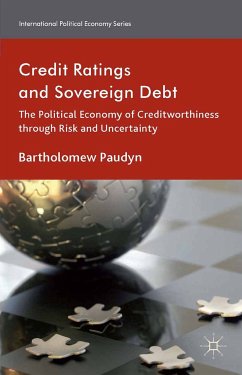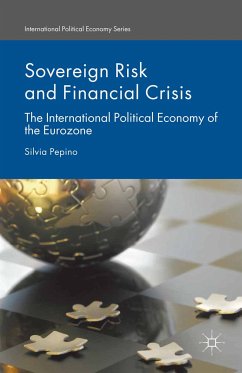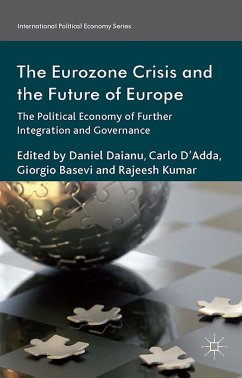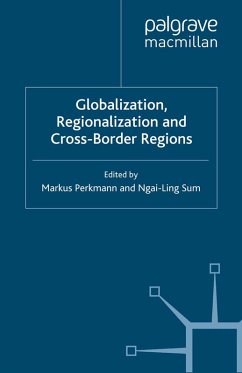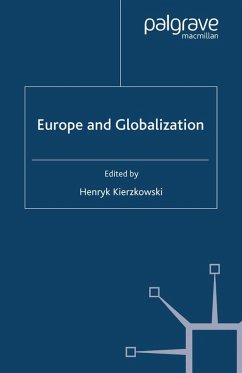B. Paudyn
Credit Ratings and Sovereign Debt (eBook, PDF)
The Political Economy of Creditworthiness through Risk and Uncertainty
40,95 €
40,95 €
inkl. MwSt.
Sofort per Download lieferbar

20 °P sammeln
40,95 €
Als Download kaufen

40,95 €
inkl. MwSt.
Sofort per Download lieferbar

20 °P sammeln
Jetzt verschenken
Alle Infos zum eBook verschenken
40,95 €
inkl. MwSt.
Sofort per Download lieferbar
Alle Infos zum eBook verschenken

20 °P sammeln
B. Paudyn
Credit Ratings and Sovereign Debt (eBook, PDF)
The Political Economy of Creditworthiness through Risk and Uncertainty
- Format: PDF
- Merkliste
- Auf die Merkliste
- Bewerten Bewerten
- Teilen
- Produkt teilen
- Produkterinnerung
- Produkterinnerung

Bitte loggen Sie sich zunächst in Ihr Kundenkonto ein oder registrieren Sie sich bei
bücher.de, um das eBook-Abo tolino select nutzen zu können.
Hier können Sie sich einloggen
Hier können Sie sich einloggen
Sie sind bereits eingeloggt. Klicken Sie auf 2. tolino select Abo, um fortzufahren.

Bitte loggen Sie sich zunächst in Ihr Kundenkonto ein oder registrieren Sie sich bei bücher.de, um das eBook-Abo tolino select nutzen zu können.
Bartholomew Paudyn investigates how governments across the globe struggle to constitute the authoritative knowledge underpinning the political economy of creditworthiness and what the (neoliberal) 'fiscal normality' means for democratic governance.
- Geräte: PC
- ohne Kopierschutz
- eBook Hilfe
- Größe: 1.87MB
Andere Kunden interessierten sich auch für
![Sovereign Risk and Financial Crisis (eBook, PDF) Sovereign Risk and Financial Crisis (eBook, PDF)]() Silvia PepinoSovereign Risk and Financial Crisis (eBook, PDF)40,95 €
Silvia PepinoSovereign Risk and Financial Crisis (eBook, PDF)40,95 €![The Eurozone Crisis and the Future of Europe (eBook, PDF) The Eurozone Crisis and the Future of Europe (eBook, PDF)]() Rajeesh KumarThe Eurozone Crisis and the Future of Europe (eBook, PDF)40,95 €
Rajeesh KumarThe Eurozone Crisis and the Future of Europe (eBook, PDF)40,95 €![Network Society and Future Scenarios for a Collaborative Economy (eBook, PDF) Network Society and Future Scenarios for a Collaborative Economy (eBook, PDF)]() V. KostakisNetwork Society and Future Scenarios for a Collaborative Economy (eBook, PDF)40,95 €
V. KostakisNetwork Society and Future Scenarios for a Collaborative Economy (eBook, PDF)40,95 €![Globalization, Regionalization and Cross-Border Regions (eBook, PDF) Globalization, Regionalization and Cross-Border Regions (eBook, PDF)]() M. PerkmannGlobalization, Regionalization and Cross-Border Regions (eBook, PDF)73,95 €
M. PerkmannGlobalization, Regionalization and Cross-Border Regions (eBook, PDF)73,95 €![Beyond Free Trade (eBook, PDF) Beyond Free Trade (eBook, PDF)]() Beyond Free Trade (eBook, PDF)40,95 €
Beyond Free Trade (eBook, PDF)40,95 €![European Capitalist Welfare Societies (eBook, PDF) European Capitalist Welfare Societies (eBook, PDF)]() P. FrericksEuropean Capitalist Welfare Societies (eBook, PDF)40,95 €
P. FrericksEuropean Capitalist Welfare Societies (eBook, PDF)40,95 €![Europe and Globalization (eBook, PDF) Europe and Globalization (eBook, PDF)]() Europe and Globalization (eBook, PDF)40,95 €
Europe and Globalization (eBook, PDF)40,95 €-
-
-
Bartholomew Paudyn investigates how governments across the globe struggle to constitute the authoritative knowledge underpinning the political economy of creditworthiness and what the (neoliberal) 'fiscal normality' means for democratic governance.
Dieser Download kann aus rechtlichen Gründen nur mit Rechnungsadresse in A, B, BG, CY, CZ, D, DK, EW, E, FIN, F, GR, HR, H, IRL, I, LT, L, LR, M, NL, PL, P, R, S, SLO, SK ausgeliefert werden.
Produktdetails
- Produktdetails
- Verlag: Palgrave Macmillan UK
- Seitenzahl: 245
- Erscheinungstermin: 19. Juni 2014
- Englisch
- ISBN-13: 9781137302779
- Artikelnr.: 41319744
- Verlag: Palgrave Macmillan UK
- Seitenzahl: 245
- Erscheinungstermin: 19. Juni 2014
- Englisch
- ISBN-13: 9781137302779
- Artikelnr.: 41319744
- Herstellerkennzeichnung Die Herstellerinformationen sind derzeit nicht verfügbar.
Bartholomew Paudyn researches/lectures in the International Political Economy (IPE) of financial and debt/fiscal relations. Prior to the London School of Economics & Political Science, he was a Postdoctoral Fellow in the Dept of Political Science at the University of Victoria (Canada) and a Visiting Fellow at the Centre for the Study of Globalisation and Regionalisation at the University of Warwick (UK). His research explores how the management through risk/uncertainty fuels a growing antagonism between the imperatives of the programmatic/epistocratic and operational/politics dimensions of budgetary governance. Currently, he is involved in projects that problematise how authoritative knowledge is constituted and expertise deployed in the political economy of creditworthiness, and what financial globalisation means for some of the most fundamental challenges facing debt/fiscal relations and national, democratic self-determination to date, such as the stable development of emerging markets (BRICs) and the integrity of Economic and Monetary Union (EMU).
Introduction: Credit Rating Crisis New Analytics of Sovereign Ratings
Socio-Technical Devices of Control Government through Risk and Uncertainty
Performative Political Economy of Creditworthiness 1. Crisis and Control
Emerging Sovereign Bond Markets Asian Flu Hits Ratings The Quest for Fiscal
Transparency New Century but Even More of the Old Contagion Risk of Ratings
Rating Legacy Lingers On Conceptual Territory of Sovereign Creditworthiness
Authoritative Knowledge Beyond Just Ideational Constructs Performativity
Politics of Resistance and Resilience Absence of a Singular and Totalizing
Neoliberal Capitalism Absence of Singular Centre to Democratic
Resistance/Resilience 2. The Rise of Risk and Uncertainty Conceptual
Lineage of Risk Period of Hegemonic Risk Financialization Security Profit
Market Risk Operational Risk Credit Risk Credit Rating Methodologies
Methodologies, Models and Assumptions Sovereign Rating Analysis Secretive
and Opaque Modalities of Government 3. Rating Performativity Performativity
Terrain Illocutionary and Perlocutionary Performativity Self-Generative
Effects for Credit Rating Agencies Conditionality, Reactivity and
Interactivity of Risk (and Uncertainty) Contagion Amplified Self-Generation
Procyclical Reinforcement Constitutive Effects for Investors Mainstream
Functionalist Explanations The Naturalization of Speculators Prohibitive
Effects for Governments Potential Performativity Breakdown 4. Epistocracy
versus Democracy Credit Ratings and the European Project Regulating the
Ratings Space 5. Problematizing the Ratings Space Repoliticization of
Creditworthiness
Socio-Technical Devices of Control Government through Risk and Uncertainty
Performative Political Economy of Creditworthiness 1. Crisis and Control
Emerging Sovereign Bond Markets Asian Flu Hits Ratings The Quest for Fiscal
Transparency New Century but Even More of the Old Contagion Risk of Ratings
Rating Legacy Lingers On Conceptual Territory of Sovereign Creditworthiness
Authoritative Knowledge Beyond Just Ideational Constructs Performativity
Politics of Resistance and Resilience Absence of a Singular and Totalizing
Neoliberal Capitalism Absence of Singular Centre to Democratic
Resistance/Resilience 2. The Rise of Risk and Uncertainty Conceptual
Lineage of Risk Period of Hegemonic Risk Financialization Security Profit
Market Risk Operational Risk Credit Risk Credit Rating Methodologies
Methodologies, Models and Assumptions Sovereign Rating Analysis Secretive
and Opaque Modalities of Government 3. Rating Performativity Performativity
Terrain Illocutionary and Perlocutionary Performativity Self-Generative
Effects for Credit Rating Agencies Conditionality, Reactivity and
Interactivity of Risk (and Uncertainty) Contagion Amplified Self-Generation
Procyclical Reinforcement Constitutive Effects for Investors Mainstream
Functionalist Explanations The Naturalization of Speculators Prohibitive
Effects for Governments Potential Performativity Breakdown 4. Epistocracy
versus Democracy Credit Ratings and the European Project Regulating the
Ratings Space 5. Problematizing the Ratings Space Repoliticization of
Creditworthiness
Introduction: Credit Rating Crisis New Analytics of Sovereign Ratings Socio-Technical Devices of Control Government through Risk and Uncertainty Performative Political Economy of Creditworthiness 1. Crisis and Control Emerging Sovereign Bond Markets Asian Flu Hits Ratings The Quest for Fiscal Transparency New Century but Even More of the Old Contagion Risk of Ratings Rating Legacy Lingers On Conceptual Territory of Sovereign Creditworthiness Authoritative Knowledge Beyond Just Ideational Constructs Performativity Politics of Resistance and Resilience Absence of a Singular and Totalizing Neoliberal Capitalism Absence of Singular Centre to Democratic Resistance/Resilience 2. The Rise of Risk and Uncertainty Conceptual Lineage of Risk Period of Hegemonic Risk Financialization Security Profit Market Risk Operational Risk Credit Risk Credit Rating Methodologies Methodologies, Models and Assumptions Sovereign Rating Analysis Secretive and Opaque Modalities of Government 3. Rating Performativity Performativity Terrain Illocutionary and Perlocutionary Performativity Self-Generative Effects for Credit Rating Agencies Conditionality, Reactivity and Interactivity of Risk (and Uncertainty) Contagion Amplified Self-Generation Procyclical Reinforcement Constitutive Effects for Investors Mainstream Functionalist Explanations The Naturalization of Speculators Prohibitive Effects for Governments Potential Performativity Breakdown 4. Epistocracy versus Democracy Credit Ratings and the European Project Regulating the Ratings Space 5. Problematizing the Ratings Space Repoliticization of Creditworthiness
Introduction: Credit Rating Crisis New Analytics of Sovereign Ratings
Socio-Technical Devices of Control Government through Risk and Uncertainty
Performative Political Economy of Creditworthiness 1. Crisis and Control
Emerging Sovereign Bond Markets Asian Flu Hits Ratings The Quest for Fiscal
Transparency New Century but Even More of the Old Contagion Risk of Ratings
Rating Legacy Lingers On Conceptual Territory of Sovereign Creditworthiness
Authoritative Knowledge Beyond Just Ideational Constructs Performativity
Politics of Resistance and Resilience Absence of a Singular and Totalizing
Neoliberal Capitalism Absence of Singular Centre to Democratic
Resistance/Resilience 2. The Rise of Risk and Uncertainty Conceptual
Lineage of Risk Period of Hegemonic Risk Financialization Security Profit
Market Risk Operational Risk Credit Risk Credit Rating Methodologies
Methodologies, Models and Assumptions Sovereign Rating Analysis Secretive
and Opaque Modalities of Government 3. Rating Performativity Performativity
Terrain Illocutionary and Perlocutionary Performativity Self-Generative
Effects for Credit Rating Agencies Conditionality, Reactivity and
Interactivity of Risk (and Uncertainty) Contagion Amplified Self-Generation
Procyclical Reinforcement Constitutive Effects for Investors Mainstream
Functionalist Explanations The Naturalization of Speculators Prohibitive
Effects for Governments Potential Performativity Breakdown 4. Epistocracy
versus Democracy Credit Ratings and the European Project Regulating the
Ratings Space 5. Problematizing the Ratings Space Repoliticization of
Creditworthiness
Socio-Technical Devices of Control Government through Risk and Uncertainty
Performative Political Economy of Creditworthiness 1. Crisis and Control
Emerging Sovereign Bond Markets Asian Flu Hits Ratings The Quest for Fiscal
Transparency New Century but Even More of the Old Contagion Risk of Ratings
Rating Legacy Lingers On Conceptual Territory of Sovereign Creditworthiness
Authoritative Knowledge Beyond Just Ideational Constructs Performativity
Politics of Resistance and Resilience Absence of a Singular and Totalizing
Neoliberal Capitalism Absence of Singular Centre to Democratic
Resistance/Resilience 2. The Rise of Risk and Uncertainty Conceptual
Lineage of Risk Period of Hegemonic Risk Financialization Security Profit
Market Risk Operational Risk Credit Risk Credit Rating Methodologies
Methodologies, Models and Assumptions Sovereign Rating Analysis Secretive
and Opaque Modalities of Government 3. Rating Performativity Performativity
Terrain Illocutionary and Perlocutionary Performativity Self-Generative
Effects for Credit Rating Agencies Conditionality, Reactivity and
Interactivity of Risk (and Uncertainty) Contagion Amplified Self-Generation
Procyclical Reinforcement Constitutive Effects for Investors Mainstream
Functionalist Explanations The Naturalization of Speculators Prohibitive
Effects for Governments Potential Performativity Breakdown 4. Epistocracy
versus Democracy Credit Ratings and the European Project Regulating the
Ratings Space 5. Problematizing the Ratings Space Repoliticization of
Creditworthiness
Introduction: Credit Rating Crisis New Analytics of Sovereign Ratings Socio-Technical Devices of Control Government through Risk and Uncertainty Performative Political Economy of Creditworthiness 1. Crisis and Control Emerging Sovereign Bond Markets Asian Flu Hits Ratings The Quest for Fiscal Transparency New Century but Even More of the Old Contagion Risk of Ratings Rating Legacy Lingers On Conceptual Territory of Sovereign Creditworthiness Authoritative Knowledge Beyond Just Ideational Constructs Performativity Politics of Resistance and Resilience Absence of a Singular and Totalizing Neoliberal Capitalism Absence of Singular Centre to Democratic Resistance/Resilience 2. The Rise of Risk and Uncertainty Conceptual Lineage of Risk Period of Hegemonic Risk Financialization Security Profit Market Risk Operational Risk Credit Risk Credit Rating Methodologies Methodologies, Models and Assumptions Sovereign Rating Analysis Secretive and Opaque Modalities of Government 3. Rating Performativity Performativity Terrain Illocutionary and Perlocutionary Performativity Self-Generative Effects for Credit Rating Agencies Conditionality, Reactivity and Interactivity of Risk (and Uncertainty) Contagion Amplified Self-Generation Procyclical Reinforcement Constitutive Effects for Investors Mainstream Functionalist Explanations The Naturalization of Speculators Prohibitive Effects for Governments Potential Performativity Breakdown 4. Epistocracy versus Democracy Credit Ratings and the European Project Regulating the Ratings Space 5. Problematizing the Ratings Space Repoliticization of Creditworthiness
